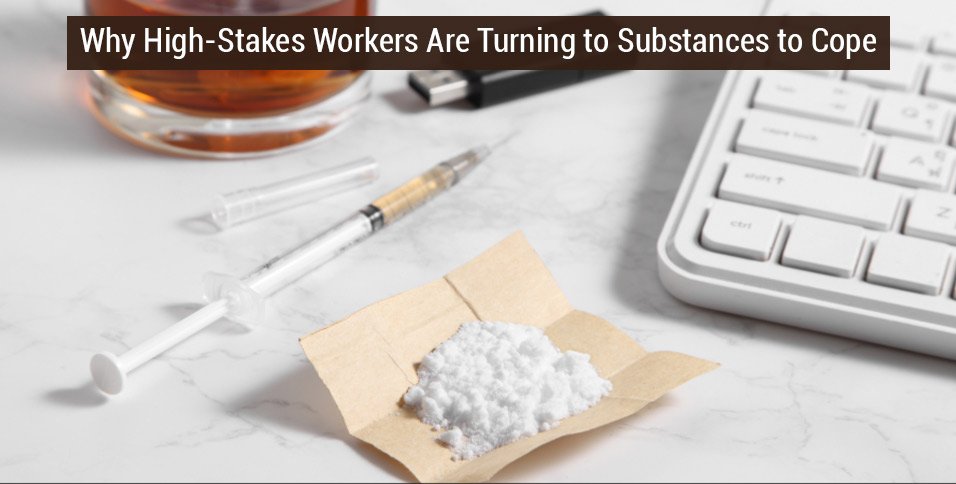People that work in high-responsibility, technically demanding jobs aren’t often seen as vulnerable. Engineers, mechanics, air traffic coordinators, aerospace manufacturers—they’re the ones who keep everything running safely and efficiently. They’re trained to troubleshoot under pressure, think fast, and hold it together when things get chaotic. But underneath all that competence, there’s something else brewing: emotional exhaustion, quiet isolation, and a growing reliance on substances to keep functioning.
This kind of work doesn’t just wear on the body—it grinds down the nervous system. And for many of these workers, the cost of keeping up appearances is starting to show.
High Performance, Quiet Collapse
The work demands serious precision, a lot of accountability, and often a level of focus that edges into hypervigilance. You can’t just “phone it in” when managing technical systems or overseeing safety protocols. Every move matters. But with that responsibility comes a constant low-grade pressure that rarely gets acknowledged.
It’s not dramatic, it’s just always there. And the more someone internalizes that pressure, the less likely they will talk about it. There’s pride in being the one others rely on. But there’s also loneliness in always being the strong one. Eventually, something’s gotta give.
Substances start to look like an answer, not a problem. A way to shut down the mental noise, to feel anything—or nothing. It’s often subtle at first. A drink to take the edge off. A few pills to fall asleep. Then more often, until you don’t know how to come down without them.
The Emotional Load No One Talks About
For people in highly technical, mission-critical jobs, emotional pain doesn’t always look the way we expect. These workers often don’t show up in therapy complaining of depression or anxiety, even if they’re experiencing it. Instead, they talk about “stress.” They say they’re tired, irritable, not sleeping. They think their fuse is shorter because they haven’t taken a vacation, not because they’re emotionally drained.
The job reinforces that stoicism. You’re rewarded for being steady under pressure. You get praised for not cracking. But that does, over time, train people to suppress everything. Stress becomes background noise. And that kind of internalized tension doesn’t just disappear—it finds outlets.
Providers must look beyond the symptoms and listen for what isn’t being said. The guy who seems like he’s just working too much? He might be self-medicating to hold himself together. The woman who says she’s fine but keeps canceling her check-ins? She might be ashamed of how far things have slipped. Shame is a powerful silencer. But healing doesn’t come from silence.
Real help starts with real conversations. And those conversations need to be honest, direct, and grounded in reality. We’re not talking about people who want to sit around and process their childhoods for six months. They want solutions that work and want to know you understand what they’re dealing with. Anything less will not work.
How Isolation Fuels Dependency
People who work in industrial settings, aviation, logistics, or long shifts on technical teams often face another quiet threat: isolation. Some are on rotating night shifts. Some travel frequently or work on call. Others are just stuck in a job that doesn’t leave time for much else. Social circles shrink. Support systems weaken. Sleep gets interrupted. Food becomes whatever you can grab. And those habits don’t just mess with your health—they wear down your ability to cope.
The body starts to operate in survival mode. Over time, substances begin filling in the gaps: taking the edge off loneliness, helping with sleep, making stress feel more distant, if only temporarily. But the more you lean on them, the more your brain starts depending on them to regulate emotion.
Many people in these industries don’t even realize they’ve crossed the line into dependency. It doesn’t look like the stereotypes they’ve been shown. They’re still going to work. Still getting the job done. But emotionally, they’re worn out. There’s nothing left in the tank.
And if nobody steps in early enough to help, things can get dark fast.
What Works For This Population
Therapists and medical providers working with this group need to understand one thing above all: you can’t throw cookie-cutter solutions at high-stakes workers and expect them to stick. This isn’t a crowd that wants generic advice or vague lifestyle tweaks. They want direct, practical help that respects how hard they work to stay functional—even when falling apart inside.
That’s where specialized care makes a difference. Programs explicitly built for people with intense job demands understand that you can’t just pull someone out of their life for 60 days and expect everything to be okay. The treatment has to fit around their responsibilities and identity, not erase it.
This is where options like rehab for Boeing insurance, group therapy, and addiction centers that understand the demands of this type of work really stand out. These programs speak their language, understand the pressure, and help workers rebuild without asking them to become someone they’re not.
When therapy and recovery are presented as practical tools—not emotional indulgence—they land differently. Resistance drops. People show up. And when they do, they often realize they’ve needed this kind of care for a long time.
How Providers Can Show Up Better
Empathy gets you in the door, but credibility keeps you there. High-functioning workers don’t want to be handled with kid gloves. They want honesty. If you’re a provider helping someone in this kind of role, your job isn’t to sugarcoat it—it’s to build trust fast, offer meaningful interventions, and normalize that needing help doesn’t make them weak.
That means knowing the language of their world, understanding the impact of rotating shifts, high-stakes accountability, and the chronic stress of always being the problem-solver, and helping them map out real steps that move them toward long-term recovery instead of vague promises of self-care.
You don’t have to be perfect. But you do have to be real. And you have to be consistent. That’s how you help someone who hasn’t felt safe letting their guard down in years finally start to heal.
No More Holding It All Together Alone
For too long, people in technically demanding, high-responsibility jobs have been expected to push through, hold it together, and pretend they’re fine no matter how much the pressure builds. That expectation is breaking people.
The good news is, it doesn’t have to stay that way. With the proper support—grounded, honest, and tailored to their reality—these workers don’t have to rely on substances just to get through the day. They can get their lives back. And maybe for the first time in a long time, they can start living like something more than just the system’s backbone. They can begin to feel human again.
What Comes Next Matters More Than Ever
There’s a window right now for providers to step up in a way that actually changes lives—not by offering generic fixes but by seeing the full human inside the high-functioning exterior. When care is real, specific, and grounded in understanding the cost of performance, recovery isn’t just possible—it becomes part of the story that a person can be proud of. No more hiding. No more pretending. Just healing that finally makes sense.













